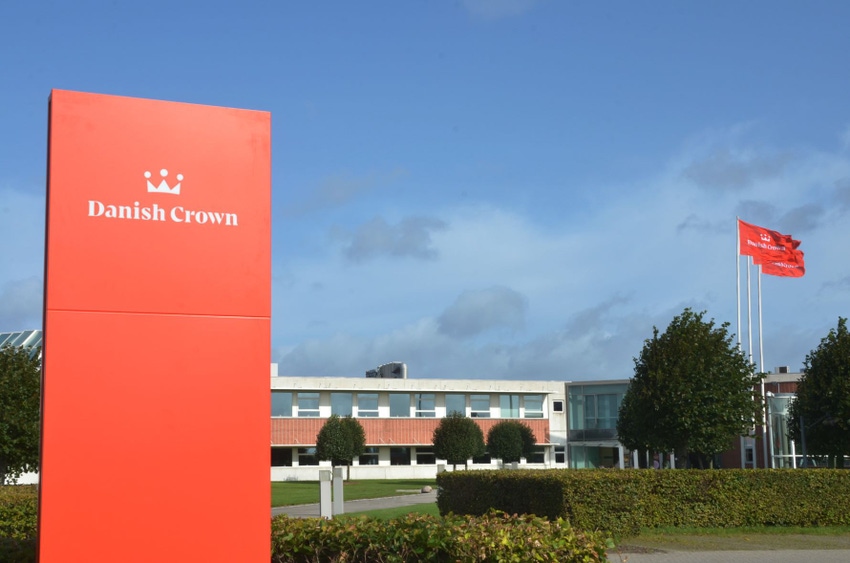Danish Crown to shutter slaughter house in Denmark
Pork producer admits to misleading consumers with "Climate-controlled pig" marketing of products.
April 19, 2024

Danish Crown is responding to what has been a challenging two years for Danish slaughter pig production, where the supply of fewer pigs for slaughter in Denmark has made it difficult to maintain efficiency levels at the group’s Danish abattoirs. The firm is therefore reducing the number of production sites in Denmark and concentrating the group’s future investments with the aim of processing the owners’ pigs into products such as bacon and pepperoni rather than primarily being a supplier of raw materials to customers worldwide.
The proposed decision to close the abattoir in Ringsted will result in the loss of almost 1,200 jobs, while approximately DKK 250 million will be made available for other investments over the next three years, and which is expected to create up to 300 new jobs in Horsens, Herning, Vejen and Blans near Sønderborg.
The changes will consolidate Danish Crown’s position as the leading meat-based food company in Europe.
“It is a heavy decision to close the abattoir in Ringsted, and especially to say goodbye to so many skilled and well-liked colleagues, but it is a necessary measure in our efforts to develop Danish Crown’s position as a modern food company. In making these changes, we are doing all we can to improve efficiency at the abattoirs and sell many more processed products to our key European customers,” says Jais Valeur, Group CEO at Danish Crown.
Turbocharging the transition
The strategy to increase the proportion of processed products was first introduced in the group strategy Feeding the Future in 2021. Here, Danish Crown reconsidered its idea about achieving growth through slaughtering more pigs, and instead decided to base its growth on increasing the value of Danish pork through the production of processed foods and more focus on sustainability.
As its first major step, Danish Crown has since invested almost DKK 1 billion in a new and state-of-the-art bacon factory near Manchester in the UK, where its annual production of more than 200 million packets of bacon has already been sold to three large British customers.
Since 2021, the number of pigs being sent for slaughter in Denmark has, however, declined significantly, and therefore it is necessary to accelerate the transition and streamline production even more in order to be able to pay the company’s owners – Danish farmers – a competitive price for their animals. The ambition is that the cooperative owners’ meat must either be sold as processed products or exported as semi-finished goods to high-price markets.
“The global pork trade has changed significantly in recent years, and the market for exporting pork for processing around the world is now dominated by Spain, the USA and Brazil. On the other hand, we see a potential for processed products, with the European market in particular showing considerable interest in the bacon and pepperoni being produced by Danish Crown,” says Valeur.
New tools being implemented
In consolidating its Danish abattoir activities at fewer facilities, Danish Crown’s capacity will be very precisely adapted to the number of pigs which the cooperative owners have pledged to deliver in the coming year. On a daily basis, this is referred to as the ‘A volume.’
When deliveries and the slaughter capacity are balanced, slaughter costs are minimized, which in turn increases the value of the pigs. Therefore, as of today, Danish Crown is activating its stability tool in an upward direction. This means that the cooperative owners can no longer continually increase their A volume. Instead, the agreed volumes are locked, so any changes require a notice period of 12 months. At the same time, a stability deduction will have to be paid if deliveries fluctuate by more than what Danish Crown’s rules permit.
“It’s imperative that something happens now, and we’re ready to use all the means at our disposal. During the past 20 years, we have repeatedly either ramped up or reduced our capacity. In other words, either by taking on or laying off hundreds of employees. Paying overtime, training new employees and ensuring we have available capacity are horribly expensive, and it costs millions of kroner each time. Therefore, we are now doing all we can to stabilize the cooperative owners’ regular deliveries of pigs, because this is one way in which we can pay the owners a competitive price that matches what is being paid in Europe,” says Asger Krogsgaard, chairman of the board of directors of Danish Crown, adding that last week Danish Crown presented a model that makes it possible for piglet producers to become cooperative owners.
Social plan to help employees move on
A significant chunk of the production that currently takes place in Ringsted will in future happen at Danish Crown’s other facilities in Denmark. The group will be investing in Horsens, Herning, Vejen and Blans near Sønderborg, so Danish Crown expects there to be enough work for the Ringsted employees who are ready to take a job at one of the company’s four other locations.
“When the decision is made to close a facility, our social plan for laid-off employees is implemented. This means, for example, that every single employee will be invited to an interview to talk about the possibility of them being employed at one of Danish Crown’s other companies. Funding is also allocated to pay for courses and education programmes which can help employees find work with another company, because it’s important for us that we help as many of our employees as possible to find a good job,” says Jesper Sørensen, senior vice president, Fresh Production, at Danish Crown.
It has been proposed that the abattoir in Ringsted should be closed in mid-September 2024.
"Danish pig is more climate-friendly than you think"
Danish Crown has also informed the Danish Supreme Court that they are responding affirmatively to the claims made by the Climate Movement in Denmark and the Danish Vegetarian Association in the case about the use of the expressions "Climate-controlled pig" and "Danish pig is more climate-friendly than you think."
Thus, Danish Crown accepts that, when they used the aforementioned statements, they did not comply with the requirements of the marketing law, and also accepts a ban on using these statements in any marketing going forward.
"Since the lawsuit was initiated, we have emphasized that it is crucial for us and the rest of the business world to be able to communicate our climate actions in order to differentiate ourselves and make climate effort a good business – and we still believe this. At the same time, the long and thorough process in the Western High Court has led to both healthy reflections and a useful debate about the boundaries when a company needs to communicate about sustainability. There is no doubt that we have learned from the lawsuit in the Western High Court.
Since we withdrew the campaign in 2021, our stance has been that we – regardless of the court's decision – would and will continue to refrain from using the expressions "Danish pig is more climate-friendly than you think" or "Climate-controlled pig" in the marketing of our products. Therefore, we also accept the plaintiffs' claim to the Supreme Court that the specific promotions in question were a violation of the marketing law.
A lawsuit across several instances is demanding on many fronts. We now wish to look forward and instead focus our efforts on transitioning to a less climate-impacting production. In these efforts, we will naturally communicate about our climate actions within the framework of the Western High Court's decision and this affirmative response to the plaintiffs' other claims.
This means that we will also continue to communicate about our climate actions in Danish Crown, but of course with great attention to ensuring that the promotions in our marketing reflect the guidelines that have been clarified in connection with the lawsuit."
You May Also Like


